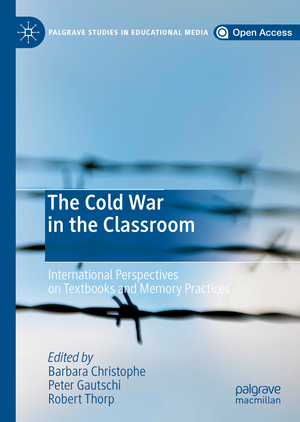The Cold War in the Classroom: International Perspectives on Textbooks and Memory Practices: Palgrave Studies in Educational Media
Editat de Barbara Christophe, Peter Gautschi, Robert Thorpen Limba Engleză Hardback – 6 noi 2019
This book explores how the socially disputed period of the Cold War is remembered in today’s history classroom. Applying a diverse set of methodological strategies, the authors map the dividing lines in and between memory cultures across the globe, paying special attention to the impact the crisis-driven age of our present has on images of the past. Authors analysing educational media point to ambivalence, vagueness and contradictions in textbook narratives understood to be echoes of societal and academic controversies. Others focus on teachers and the history classroom, showing how unresolved political issues create tensions in history education. They render visible how teachers struggle to handle these challenges by pretending that what they do is ‘just history’. The contributions to this book unveil how teachers, backgrounding the political inherent in all memory practices, often nourish the illusion that the history in which they are engaged is all about addressing the past with a reflexive and disciplined approach.
Preț: 237.05 lei
Nou
Puncte Express: 356
Preț estimativ în valută:
45.36€ • 47.49$ • 37.53£
45.36€ • 47.49$ • 37.53£
Carte tipărită la comandă
Livrare economică 07-21 aprilie
Preluare comenzi: 021 569.72.76
Specificații
ISBN-13: 9783030119980
ISBN-10: 303011998X
Pagini: 427
Ilustrații: XXX, 459 p. 27 illus.
Dimensiuni: 148 x 210 mm
Greutate: 0.74 kg
Ediția:1st ed. 2019
Editura: Springer International Publishing
Colecția Palgrave Macmillan
Seria Palgrave Studies in Educational Media
Locul publicării:Cham, Switzerland
ISBN-10: 303011998X
Pagini: 427
Ilustrații: XXX, 459 p. 27 illus.
Dimensiuni: 148 x 210 mm
Greutate: 0.74 kg
Ediția:1st ed. 2019
Editura: Springer International Publishing
Colecția Palgrave Macmillan
Seria Palgrave Studies in Educational Media
Locul publicării:Cham, Switzerland
Cuprins
Chapter 1. Introduction; Barbara Christophe.- PART I. Textbook Memories.- Chapter 2. Textbook Memories of the Cold War: Introduction to Part I; Barbara Christophe.- Chapter 3. Manufacturing Coherence: How American textbooks incorporate diverse perspectives on the origins of the Cold War; Eva Fischer.- Chapter 4. Between radical shifts and Persistent Uncertainties: The Cold War in Russian history textbooks; Aleksandr Khodnev.- Chapter 5. The emergence of a multipolar world: Decentering the Cold War in Chinese history textbooks; Lisa Dyson.- Chapter 6. Americans and Russians as representatives of Us and Them. Contemporary Swedish school history textbooks and their portrayal of the central characters of the Cold War; Anders Persson.- Chapter 7. Images and Imaginings of the Cold War - with a focus on the Swiss view; Markus Furrer.- Chapter 8. Between non-human and individual agents: The attribution of agency in chapters on the Cold War in Flemish history textbooks; Karel Van Nieuwenhuyse.-Chapter 9. The Cold War and the Polish question; Joanna Wojdon.- Chapter 10. The Cold War in South African history textbooks; Linda Chisholm and David Fig.- Chapter 11. Dictatorship and the Cold War in official Chilean history textbooks; Teresa Oteiza and Claudia Castro.- PART II. Teachers' Memories.- Chapter 12. Teacher's memories and the Cold War: Introduction to Part II; Robert Thorp and Barbara Christophe.- Chapter 13. Ambivalence and the illusion of hegemony: Remembering the Cold War in Germany and Switzerland; Barbara Christophe.- Chapter 14. 1968 in German-speaking Switzerland: Controversies and interpretations; Nadine Ritzer.- Chapter 15. Reconciling opposing discourses: Narrating and teaching the Cold War in an East-German classroom; Eva Fischer.- PART III. Memory Practices in the Classroom.- Chapter 16. Introduction to Part III: Memory Practices in the Classroom; Peter Gautschi and Barbara Christophe.- Chapter 17. Selecting, stretching and missing the frame: Teachers and students from Germany and Switzerland make sense of the Cold War; Barbara Christophe.- Chapter 18. Learning from others: Considerations within history didactics on introducing the 'Cold War' in lessons in Germany, Sweden and Switzerland; Peter Gautschi and Hans Utz.- Chapter 19. Pedagogical entanglements and the Cold War: A comparative study on opening history lessons on the Cold War in Sweden and Switzerland.
Notă biografică
Barbara Christophe is Senior Researcher at the Georg Eckert Institute, Germany and is Deputy Head of the Media Transformation department.
Peter Gautschi is the Head of the Lucerne Institute of History Education and Memory Cultures at the University of Teacher Education Lucerne, Switzerland.
Robert Thorp is Senior Lecturer of Education at Stockholm University, Sweden, and Lecturer of Education at The University of Newcastle in Australia.
Caracteristici
Analyses how textbooks can influence or affect understanding of the Cold War Discusses how history textbooks can help to reconstruct hegemonic discourses and offer insights into disputed issues Addresses the dual identity of history teachers as members of a state elite and individuals with their own memories and loyalties











